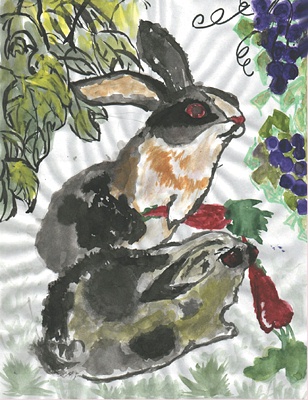All Nonfiction
- Bullying
- Books
- Academic
- Author Interviews
- Celebrity interviews
- College Articles
- College Essays
- Educator of the Year
- Heroes
- Interviews
- Memoir
- Personal Experience
- Sports
- Travel & Culture
All Opinions
- Bullying
- Current Events / Politics
- Discrimination
- Drugs / Alcohol / Smoking
- Entertainment / Celebrities
- Environment
- Love / Relationships
- Movies / Music / TV
- Pop Culture / Trends
- School / College
- Social Issues / Civics
- Spirituality / Religion
- Sports / Hobbies
All Hot Topics
- Bullying
- Community Service
- Environment
- Health
- Letters to the Editor
- Pride & Prejudice
- What Matters
- Back
Summer Guide
- Program Links
- Program Reviews
- Back
College Guide
- College Links
- College Reviews
- College Essays
- College Articles
- Back
Jo Jo Rabbit, More Than Just An Ordinary Satirical
The overall concept of a satirical Holocaust movie may disturb a large portion of movie watchers and is not a unique idea. Often movies of this style pride themselves on edgy/dark humor that appeals to a small audience. Some of these movies attempt to include more serious moments to justify the more disturbing humor, but these moments often leave many viewers unimpressed. Writer/director Taika Waititi decided to challenge this formula with the movie Jojo Rabbit. The movie is equally serious and satirical leaving viewers feeling real emotions of both joy and sadness.
Jojo Rabbit follows a young German child named Jojo as he realizes the Nazis are pointlessly killing innocent people. The movie begins with the introduction of his imaginary friend, satirical Hitler. Jojo has dreams of fighting in the war and becoming a good enough Nazi to be friends with the real Hitler. Jojo’s mother is against the Nazi beliefs and his father is fighting in the resistance. Jojo’s mother tries to teach him right from wrong but Jojo’s Nazi dreams are not altered until he meets the Jewish girl that his mother has provided shelter for. Throughout the movie, Jojo struggles internally with his beliefs as shown by his imaginary Hitler. This provides a unique perspective on the child’s mind that is funny to watch while also having serious undertones that intrigue the viewer.
The satirical portion of the movie thrives on the dysfunction and naive ideas that the Nazi’s had. The movie overemphasizes the use of children as soldiers creating a comedic environment that doesn’t make the viewer uncomfortable. The movie avoids the humor that feels edgy just to be edgy while brushing on topics that many directors run from. Some satirical movies can make the viewer feel uncomfortable to laugh at in a theater, but Jojo Rabbit was well written to never cross that boundary.
Taika Waititi was incredibly careful not to add jokes during the serious scenes. Even the largest of studies can make the mistake of adding humor during serious moments to “lighten the mood”. These jokes usually just make the viewer uncomfortable and ruin the built-up immersion of the scene. The serious portion of the movie allows the viewer to grow attached to the characters, unlike most satiricals of the genre. The movie provides the perspective of Germans that love their country but disagree with the Nazi’s beliefs which makes the viewer reconsider their view of Germans during the war. Jojo Rabbit includes some of the tragedy that was faced by these Germans leaving many viewers in tears while putting smiles on their faces during the small victories.
Throughout the movie Jojo Rabbit, Taika Waititi does an incredible job of playing with the viewer's emotion to put messages across that are often overlooked. The movie avoids dark humor while covering topics that most directors avoid and in the end succeeds at providing the viewer with an enjoyable experience. Leaving the movie, I continued to think about the surprises the movie threw at me, the jokes that made me laugh out loud, and the overall messages that makes this movie worth seeing.
I would recommend the movie to any audience that enjoys comedy- 5/5 stars

Similar Articles
JOIN THE DISCUSSION
This article has 0 comments.
